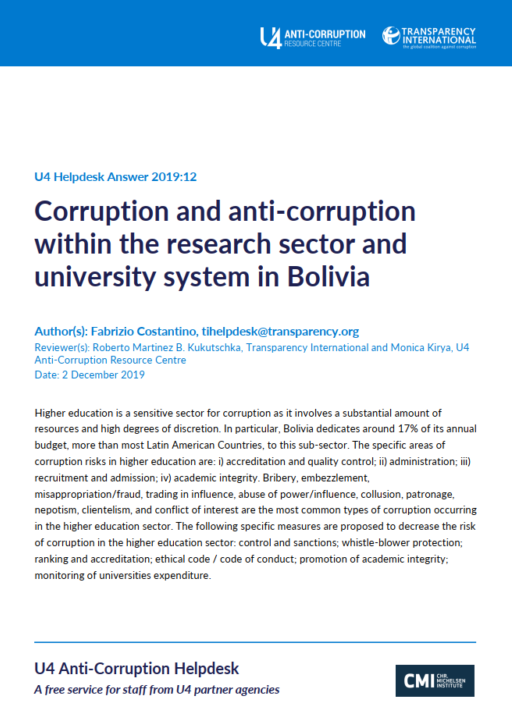- Home
- Anti-Corruption Helpdesk
- Corruption and anti-corruption within the research sector and university system in Bolivia
Corruption and anti-corruption within the research sector and university system in Bolivia

This Anti-Corruption Helpdesk brief was produced in response to a query from a U4 Partner Agency. The U4 Helpdesk is operated by Transparency International in collaboration with the U4 Anti-Corruption Resource Centre based at the Chr. Michelsen Institute.
Query
Please provide an overview of corruption and anti-corruption within the research sector and university system in Bolivia.
Summary
Higher education is a sensitive sector for corruption as it involves a substantial amount of resources and high degrees of discretion. In particular, Bolivia dedicates around 17% of its annual budget, more than most Latin American Countries, to this sub-sector. The specific areas of corruption risks in higher education are: i) accreditation and quality control; ii) administration; iii) recruitment and admission; iv) academic integrity. Bribery, embezzlement, misappropriation/fraud, trading in influence, abuse of power/influence, collusion, patronage, nepotism, clientelism, and conflict of interest are the most common types of corruption occurring in the higher education sector. The following specific measures are proposed to decrease the risk of corruption in the higher education sector: control and sanctions; whistle-blower protection; ranking and accreditation; ethical code / code of conduct; promotion of academic integrity; monitoring of universities expenditure.
Contents
- Corruption in the Bolivian higher education sector and university system
- Corruption in Bolivian higher education sector: a risk assessment
- Measures to fight corruption in Bolivian higher education sector
- Conclusions
Main points
- Bolivia dedicates around 17% of its annual budget to education, more than most Latin American countries.
- Bolivia does not have specific regulations to address corruption in higher education as it refers to the broader anti-corruption legal framework, which has been consistently reformed in the last decade.
- The higher education sector features four main areas of risk: accreditation and quality control; administration; recruitment and admission; academic integrity.
- The following specific measures are proposed to decrease the risk of corruption in the higher education sector: control and sanctions; whistleblower protection; ranking and accreditation; ethical code/code of conduct; promotion of academic integrity; monitoring of universities expenditure.
Caveat
For the purpose of this Helpdesk answer, higher education is understood to include teaching, research, and related work (Pucciarelli& Kaplan Andreas, 2016).
Authors
Fabrizio Costantino
Reviewers:
Roberto Martinez B. Kukutschka, Transparency International and Monica Kirya, U4 Anti-Corruption Resource Centre
Date
20/01/2020
Tags
 Download PDF
Download PDF
